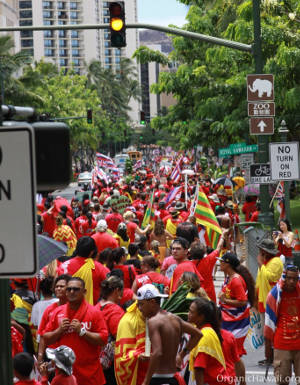From GMO Free Hawai’i Island:
It recently came to our attention that NASDA, the National Association of State Departments of Agriculture, is having a closed door meeting in Kona next week, and they will be discussing the setting of the agenda for agriculture throughout all the states for the next five years. And what is most troubling besides the meeting’s secrecy and use of public agencies, is that the speakers and agenda items mostly concern the interests of the biotech industry.
Speakers include:
- Marjory Bronster – the lawyer who is suing three counties in Hawai’i on behalf of the biotech industry for passing laws regulating GE agriculture
- Dennis Gonsalves – the creator of the GMO papaya, and the chair of the whole national association
- our own Hawai’i Department of Agriculture chair Scott Enright
One can speculate what the reason is for having this meeting in private on Hawai’i Island; most of the chemical companies have their experimental GE field trials and grow outs on the other islands, so perhaps it will be easier to paint a rosier picture of “the success of GMO farming in Hawai’i,” and use this as a model to follow through the rest of the country without the distraction of having to contend with communities most affected by these toxic farming practices. With agenda items such as “Preventing Flawed Food Safety Research From Becoming Scientific Dogma”, and the chosen speakers, it seems pretty clear that the ongoing exposure of the promotion of junk science conducted by the biotech industry, and studies showing the ill effects of these technologies on animals for example are increasing the need on the part of the biotech industry to control the messaging in order to save their business model from the public finding out about the actual science that shows harm.
GMO Free Hawai’i Island is considering holding a protest on the highway in front of resort; email them at gmofreehawaiiisland@gmail.com if you would be able to attend on Sunday, September 13th at the Sheraton Kona Resort.
You can read the official press release, or see the agenda.

